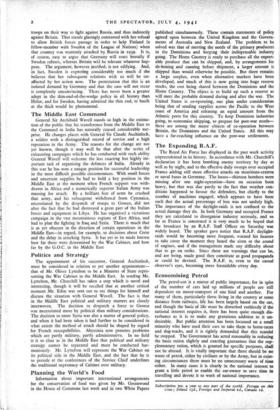Politics and Strategy
The appointment of his successor, General Auchinleck, must be considered in relation to yet another appointment— that of Mr. Oliver Lyttelton to be a Minister of State repre- senting the War Cabinet in the Middle East. In sending Mr. Lyttelton, Mr. Churchill has taken a step which is novel and interesting, though it will be recalled that at another critical moment Mr. Eden was sent out to see things for himself and discuss the situation with General Wavell. The fact is that in the Middle East political and military matters are closely interwoven. The decision to despatch a force to Greece was necessitated more by political than military considerations. The decision to enter Syria was also a matter of general policy, and when it had been taken it had further to be considered to what extent the method of attack should be shaped by regard for French susceptibilities. Abyssinia now presents problems which are partly military, partly administrative. In no field is it so clear as in the Middle East that political and military strategy cannot be separated and must be conducted har- moniously. Mr. Lyttelton will represent the War Cabinet on its political side in the Middle East, and the fact that he is to preside at the conferences of the Service Chief underlines the traditional supremacy of Cabinet over military.






























 Previous page
Previous page